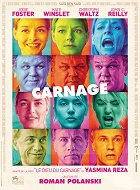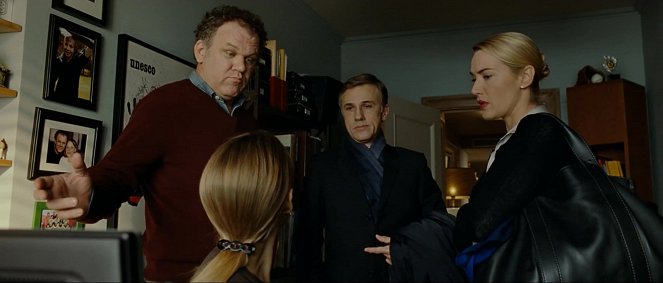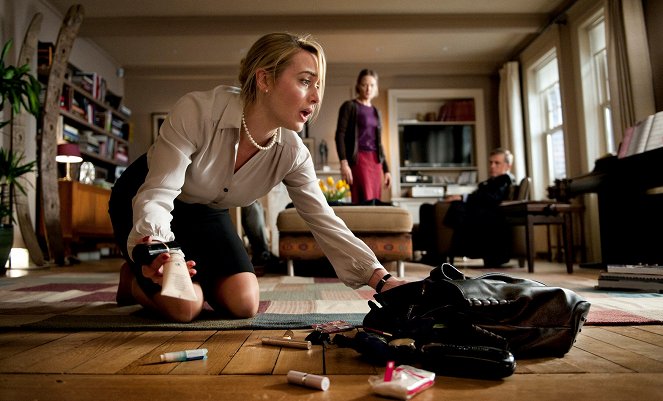Directed by:
Roman PolańskiCinematography:
Pawel EdelmanComposer:
Alexandre DesplatCast:
Jodie Foster, Kate Winslet, Christoph Waltz, John C. Reilly, Elvis Polanski, Joseph Rezwin, Tanya Lopert, Julie AdamsVOD (1)
Plots(1)
Set in contemporary Brooklyn, New York, CARNAGE centers on two pairs of parents, one of whose child has hurt the other at a public park, who meet to discuss the matter in a civilized manner. However, as the evening goes on, the parents become increasingly childish, resulting in the evening devolving into chaos. (official distributor synopsis)
Videos (13)
Reviews (12)
Closer was a theater play adapted to the screen, i.e. translated into film language. Carnage is not an adapted theatre play, but rather a theater play shot and edited for the screen. Theatre actors cannot rely on their facial expressions (which the audience cannot see from afar), and that’s why they are forced to overact – they must resort to exaggerated body language and loud voices. Carnage doesn’t translate the original play into film language and statically captures theatrical acting on the screen (while showing the actors’ faces from up close). That’s why some viewers say it’s an unnecessary film. For me, however, it is not unnecessary for two reasons: 1. Even if someone made me see the play in the theater, I’d hardly get the chance to see it with these four actors. 2. To watch these four actors while knowing they’d be happy to perform for Roman Polanski even without a paycheck is nothing short of an honor.
()
“My Kokoschka!“ With films such as Repulsion, The Tenant and Death and the Maiden, Polanski demonstrated that he can build tension with just one room and a few actors to the point where we are ready for anything while having no idea what to expect. Carnage is made up of concise scenes, yet it continuously puts great effort into the absolute deconstruction of civilisation (which, together with the enclosed space, is reminiscent of the darker The Exterminating Angel). ___ The quartet of sufficiently different people who are, however, afflicted with the same social pretence gradually forget the basics of polite behaviour and even what social group they belong to. They lose their cool, inhibitions and even control over their own bodies, driven by concealed aggression and instinct (grunting laughter, automatic reactions to a ringing telephone). ___ In contrast to the original plan (a calm discussion in a setting decorated with tulips from Holland), the non-observance of which will most adversely affect Penelope, they begin to reveal their own transgressions and character flaws with devastating honesty. Their attachment to material things (mobile telephone, handbag, cigars, a bottle of Scotch, art books) is merely a triviality to get the ball rolling. ___ Their inability to face the unpleasantness which they would prefer to remove from their lives, like getting rid of a bothersome hamster, comes back to haunt them. We are not watching the failure only of individuals confusedly taking on different roles (man/woman, partner, parent) for a moment, but of an entire community. Only by gradually breaking down the civilisational walls that we build around ourselves is it possible to return from selfishly resolving personal problems to the suppressed collective (un)consciousness. Rejoining the clan that we left voluntarily and whose other members we only pretend to be interested in. The meeting, whose consequences are wisely concealed from us, could be beneficial for the participants at least as a means of returning them to their wild essence (indicated by the drums in the opening and closing background music) and the attendant self-discovery. ___ Behind the comedy, intensified with perfectly timed jokes to the point of inducing a nervous breakdown in everyone involved, there is a bitter, almost anthropological study of human dissatisfaction and the inability to overcome that dissatisfaction. (Their publicly revealed unhappiness derives “only” from honestly describing their current state.) For example, through the entirely banal acceptance of responsibility for parenting. Also, dealing with outside and, for example, even very remote problems (Darfur) doesn’t offer any redemption, but just another way to avoid the essence of the matter at hand. This is correctly pointed out by Alan, whose absolute indifference to the fleeting family-relationship bullshit enables him to have the most sober view of the whole farce (another thing is that his work may be even more fleeting as a result of that indifference). ___ Waltz’s precise gestures and intense emphasis on words with the potential to create conflict, complemented with the nonchalance with which he turns the Longstreets’ apartment into his workspace (or rather a café with a bar) make him the star of the proceedings in my opinion. With his “I don’t think anything” attitude, John C. Reilly is also excellent, as his Michael, an entirely simple man burdened with a mostly unresolved Oedipal complex, is the first to lose interest in pretending. However, the women do not stay in the background, as they are believably hysterical and, at the same time, above the men’s one-upmanship. ___ The mirror in the film serves to optically enlarge the space and, like the placement of the characters in the individual shots, informs us of the current distribution of belligerent forces, while the film itself is also a mirror. If you’re willing to look into it for a mere eighty minutes and think about what you’ve seen, perhaps it will, for starters, make you not brush off the question “How are you?” with the same answer as usual. Yeah, idealism. I’m healing. By observing people. Appendix: It occurred to me later that Carnage could also be understood as a politically incorrect response to The Descendants, a film that avoids the truth with such determination that if there were any sex in it, the people doing it would probably pray even when casting off the masks of civilisation (another one of Alan’s apt observations). 90%
()
(less)
(more)
When I first heard that acclaimed director Roman Polanski was going to make a somewhat more intimate film with such bright stars as Kate Winslet, Christoph Waltz, Jodie Foster and John C. Reilly, I couldn't believe my ears and said I just had to see this. And the wait has borne fruit! Carnage is in many ways a nearly perfect film that basically takes place in one apartment, where an initially innocent conversation between four adults turns into a wild quarrel between misbehaving children. The actors were all great - the extremely snarky Waltz, the hilariously drunk and laughing lady actresses, and the "mouse-loving" Reilly. All in all, a very nice and enjoyable film, perfect for brightening up the evening and improving the mood.
()
It’s straightforward, simple conversational theater translated to the screen. And yet excellent. A good text and four confident actors are all you need. The movie theater roared with laughter throughout the screening, because where else will we all see ourselves other than in stereotypes of arguments and gender wars? Nothing about it is perfect, nothing is convincing and it’s full of acting mannerisms, but it is really nice. Where else can one you Kate Winslet puking all over the screen? That’s definitely included. It's just too bad that Julie Adams from Creature from the Black Lagoon has only a tiny cameo here.
()
Good dialogues are a good foundation of a high-quality dialogue-based movie. The premise itself takes the lead role here – it’s incredibly original – and the actors are doing such a great job it seems they loved the premise as well. My personal favorite was Christopher Waltz and his incredibly arrogant lawyer. Nevertheless, I believe that different viewers will fall for different characters. This movie literally lives and dies with the actors and I believe that a stage play with good actors could yield the same result.
()


